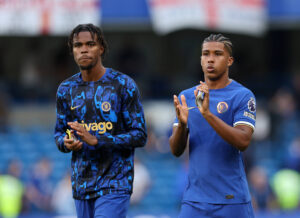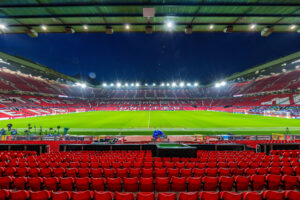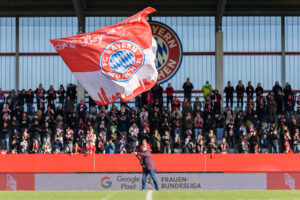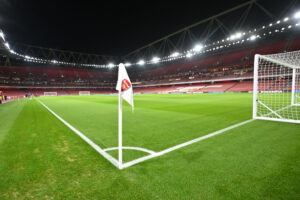There is an argument that Chelsea are the luckiest of clubs, because they have enjoyed an outrageous piece of good fortune that has somehow transformed their fortunes not once, but twice.
The first time came in 1970, when they won the FA Cup Final against Leeds, after a replay at Old Trafford. The final – or rather the replay – was certainly a fine one, as Chelsea eventually defeated Leeds, the favourites and last year’s league champions, winning 2-1 to claim their first ever FA Cup.
What was most amazing about that final, however, was not what happened at Old Trafford but what went on throughout the whole of Britain, as seemingly the entire nation tuned in to watch, creating a record TV audience for a cup final, which still stands to this day, of nearly 30 million people.
That was not simply because people were attracted to such an intriguing game between two great rivals but because the match was being shown live on ITV and both the two BBC channels at the time were not showing anything at all, as a strike by BBC staff kept BBC screens dark. Consequently, Chelsea’s win was literally the only show on TV and by winning that match Chelsea, who had only ever won one major trophy before, secured a whole generation of new supporters, including such notable figures as the novelist Roddy Doyle, who in a normal year might never have watched them at all.
Chelsea’s second great stroke of luck came over 30 years later, when Roman Abramovich bought the club from Ken Bates, when, by Bates’s own admission, it was virtually on the brink of bankruptcy. Had Jesper Gronkjaer not scored a winner against Liverpool in the last league game of the 2002-03 season – a match that was virtually a play-off for Champions League qualification between the two sides – Abramovich would surely have passed on buying the Blues and Chelsea’s recent history of league, cup and even Champions League success would surely have been very different.
Of course, that Abramovich has effectively bankrolled the club to such spectacular success since 2003 has only added to the enmity that many fans of other teams have felt towards Chelsea. And that enmity was only added to by Abramovich’s appointment—twice—of José Mourinho.
By his own admission, Mourinho is the arch provocateur, who routinely uses press conferences and post-match interviews to wage his mind games against opposing managers and teams. He was such a controversial figure that when he departed in the middle of last season, for the second and surely last time, even some Chelsea fans admitted to feeling some relief that he had finally left the club.
It was into that post-Mourinho void that Antonio Conte stepped last summer. It is fair to say that his appointment as Chelsea manager was not greeted with much enthusiasm, even among Chelsea fans themselves. The appointments at the same time of Pep Guardiola as Manchester City manager and of Mourinho as the Manchester United boss received far more attention than the appointment of Conte at Stamford Bridge, notwithstanding his excellent work with the Italian national team last summer at the European Championship.
For all that Italy had played probably their best football for a decade under Conte, the general impression of the Italian before he arrived in England was that he had been incredibly lucky to have been in charge of Juventus when they had restored the apparent natural order in Italian football and won three titles in a row.
He quit Juventus in the summer of 2014, allegedly because the club would not buy the reinforcements he wanted to sustain a meaningful Champions League challenge. The fact that his successor at Juve, Massimiliano Allegri, not only continued to win Serie A titles with essentially the same group of players but actually took them to the Champions League final in 2015, only seemed to confirm that Conte was a lucky manager rather than a great one.
However, Conte’s work this season in England has been exceptional and the Blues find themselves with plenty of breathing space at the top of the Premier League table, with the title seemingly in their grip. He has faced each major challenge with absolute aplomb and no little style and grace.
First, he effected probably the most important tactical overhaul in English football since Alf Ramsey created his “wingless wonders” in 1966 and won the World Cup with the original 4-4-2 system. Conte, of course, ditched Chelsea’s own 4-4-2 set-up after successive defeats by Liverpool and Arsenal in the autumn, and his new 3-5-2 system, which he had used so well at Juventus, subsequently took Chelsea on a run of 13 straight league wins, which has surely burned off all their rivals in the title race.
Then, when it seemed a spanner had been thrown in the works by the apparent desire of Diego Costa (or his agent) to take a fast plane to China, Conte responded magnanimously and magnificently, simply leaving Costa out against Leicester, ostensibly because of a back problem, and watching his team win 3-0 before equally effortlessly easing him back into the team thereafter. The fact that Costa has been a changed player this season, channelling his aggression into superb centre-forward play, is surely a testament to Conte’s man-management skills.
Last season, Mourinho lost control at Chelsea and ultimately lost his job. This season, Conte has restored managerial control, to the extent that Roman Abramovich, so often seen scowling at different managers and indifferent performances over the last decade, has barely been seen at all this season, and if he has been seen he has invariably been smiling.
The other factor in Conte’s favour is his sheer likeability. He has been extremely impressive in his management of both players and media, and has always been appropriately respectful of the opposition. For example, before facing Liverpool at Anfield this week, Conte pointed out that he was looking forward to going to such a famous ground, especially as he had never appeared there as a player. All of this has endeared him to fans and not only Chelsea fans, but even opposition fans.
All in all, Conte has already achieved remarkable things in his first season in England. Of course, it will only get harder in the future, as Chelsea will certainly be back in the Champions League next season, which will place greater demands on a squad that he has already said he wants to strengthen in the summer, with Alvaro Morata lined up as an ideal replacement for Costa if the striker does finally leave for China.
In the meantime, however, Conte’s greatest achievement is simply to make Chelsea, a club that for so long has been to say the least largely unloved and unadmired an infinitely more attractive proposition, both on and off the pitch.
Main Photo






